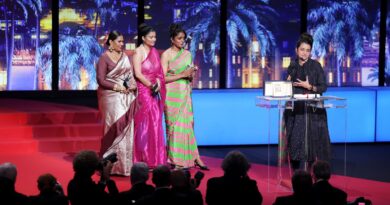African leaders urge Putin to end blockade of Ukraine’s grain
The appeal comes after Moscow renewed its blockade on Ukrainian ports last week, preventing Kyiv from shipping grain, and attacked Ukrainian grain stores and port facilities.
In his address at the summit in St. Petersburg, Assoumani, the president of Comoros, an island nation off the coast of East Africa, said that opening export access to both Ukrainian and Russian grain would save African lives.
Assoumani spoke directly after Russian President Vladimir Putin, who is using the summit as a way to try to cut Ukrainian grain out of African markets, told the African leaders who were there that Russia would replace Ukrainian grain supplies to Africa and boasted that Russia accounts for 20 percent of global supplies.
Although the Kremlin has portrayed its grab for market share as a “humanitarian” project, its move to blockade Ukrainian grain from world markets would enable Moscow to benefit from higher grain prices, reap the value of stolen Ukrainian grain in occupied regions, and undermine Ukraine’s economy.
But Assoumani pushed back against the Russian leader’s claim that Russia would provide grain to Africa without the need for Ukrainian supplies.
Although Russia was “cooperating” to resolve the crisis, “our continent is currently being severely impacted by food prices. So we are appealing to all participants in the process with a big request to facilitate access to both Ukrainian and Russian food,” he said in comments translated from French into Russian.
He said the issue of grain supply was “the most important vital problem for us,” and he warned that “the suspension of the grain deal may have some impact on our cooperation.”
International Monetary Fund chief economist Pierre-Olivier Gourinchas told journalists Tuesday that global grain prices could increase by as much as 15 percent as a result of the blockade. A day earlier, Russia attacked grain shipping and storage facilities on the Danube River, threatening Ukraine’s last major export route for grain.
Putin was unapologetic about the blockade and accused the West of “hypocritically accusing us of the current crisis situation in the world food market.” He repeated his recent contention that only three percent of grain shipped under the grain deal with Ukraine went to the lowest-income nations. According to the United Nations, 57 percent of the grain went to developing countries.
He insisted Russia was “a solid, responsible international supplier of agricultural products.”
“And those who claim that this is not so, that [this is] only securing this so-called grain deal for the export of Ukrainian grain, are simply distorting the facts, telling lies,” he added. “As a matter of fact, this has been the practice of some Western states for decades, if not centuries.”
Critics have warned that Russia’s move to cut Ukraine out of the African market would leave African nations more dependent on grain from Russia, which has never been shy about using its muscle in other sensitive fields, such as gas and oil, to exert political pressure.
“Anyone who thinks Russia won’t continue to weaponize grain if it succeeds in knocking Ukraine out of the global supply chain hasn’t been paying attention,” analyst Sam Greene of King’s Russia Institute at King’s College London said in a social media post on Wednesday.
Putin told the African leaders that Russia would deliver 25,000 to 50,000 metric tons of wheat free of charge to Zimbabwe, Mali, the Central African Republic, Burkina Faso and Eritrea, all nations with close Russian ties, as well as Somalia, which is facing an acute food security crisis.
More than 23 million people in Ethiopia, Kenya and Somalia face severe hunger, according to the World Food Program. But Russia has donated only $6.5 million to the United Nations’ World Food Program so far this year, according to WFP data, lower than donations from impoverished nations such as Honduras, South Sudan and Guinea Bissau.
Assoumani called for sustainable peace between Russia and Ukraine “on behalf of the African Union,” saying, “because this is what humanity needs today.”
He also condemned Wednesday’s coup in Niger, an impoverished landlocked state in the strategic Sahel region of Africa, and demanded the immediate release of Nigerien President Mohamed Bazoum and his family. Kremlin spokesman Dmitry Peskov said the coup would be “actively discussed” at the summit.
Yevgeniy Prigozhin, leader of the state-funded Wagner mercenary group and Concord group companies, which for years have operated as deniable proxies for the Russian state in Africa, appeared in a photograph posted on Wagner-affiliated Telegram channels depicting him in a St. Petersburg hotel with a representative of the government of Central African Republic, for which Wagner and other Prigozhin entities provide military and propaganda services. The channels reported that the photograph was taken during the summit.
Wagner-affiliated Telegram channels on Thursday cheered the coup in Niger as an opportunity to extend the group’s influence in Africa’s Sahel region by fostering ties with the new military leadership. Niger, east of Mali, where Wagner mercenaries have a significant presence, sits in a key strategic slice of the Sahel and is one of the world’s largest sources of uranium.
Putin’s calls for an end to U.S. global dominance and a new world order resonate strongly across much of Africa. Assoumani said Africans want to see a fairer global order, with the continent represented as a permanent member of the United Nations Security Council and a member of the G-20, a group of the world’s 20 largest economies that account for 85 percent of global economic output. Putin said on Thursday that Russia supports making the African Union a full member of the G-20.
“We are today fighting for a multilateral multipolar world. We Africans understand very well that today the international system must be reformed, in particular the U.N. system,” the African leader said.
Natalia Abbakumova in Riga, Latvia, contributed to this report.



